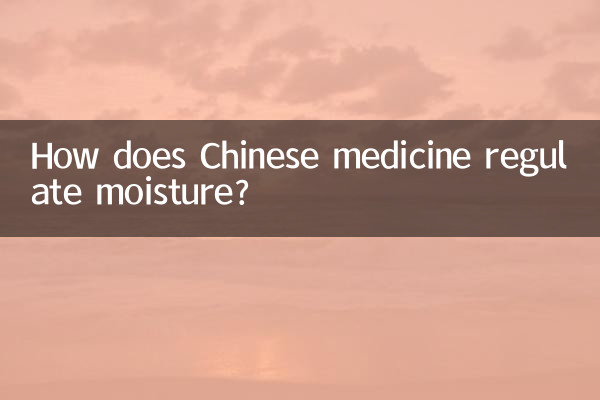How does Chinese medicine regulate moisture?
In recent years, moisture issues have become a health topic of concern to many people. Excess moisture can cause physical fatigue, joint pain, skin problems and many other discomforts. Traditional Chinese medicine believes that moisture is one of the "six evils", and regulating moisture requires various aspects such as diet, living habits, and traditional Chinese medicine treatment. This article will combine the hot topics and hot content on the Internet in the past 10 days to give you a detailed introduction to traditional Chinese medicine methods for regulating moisture.
1. Manifestations and hazards of moisture

Common symptoms of heavy moisture include:
| Symptoms | Specific performance |
|---|---|
| heavy body | Feeling weak in limbs and slow in movement |
| skin problems | Eczema, acne, oily skin |
| digestive problems | Loss of appetite, bloating, sticky stools |
| joint discomfort | Joint soreness and swelling |
Long-term excess moisture may lead to reduced immunity and even chronic diseases, so timely conditioning is particularly important.
2. Traditional Chinese Medicine methods for regulating moisture
Traditional Chinese medicine regulates moisture mainly from the following aspects:
| Conditioning method | Specific measures |
|---|---|
| diet conditioning | Eat more dehumidifying foods such as barley, red beans, and yams, and eat less raw, cold, and greasy foods. |
| living habits | Avoid living in a humid environment for a long time and exercise appropriately to eliminate sweat. |
| Chinese medicine conditioning | Take traditional Chinese medicines such as Poria, Atractylodes, and Atractylodes to dispel dampness. |
| Acupuncture and massage | Stimulate acupoints through acupuncture or massage to promote qi and blood circulation |
3. Recommended popular dietary remedies for removing dampness
According to recent hot topics on the Internet, the following dietary remedies for removing dampness have attracted much attention:
| Dietary therapy | Ingredients | Efficacy |
|---|---|---|
| Red bean and barley porridge | Red beans, barley, rock sugar | Diuretic, reduce swelling, strengthen the spleen and remove dampness |
| Poria and yam soup | Poria, yam, lean meat | Strengthen the spleen and replenish qi, remove dampness and calm the nerves |
| Winter Melon Lotus Leaf Tea | Winter melon peel, lotus leaves, cassia seeds | Clear away heat and dampness, lower fat and lose weight |
4. Precautions for removing dampness in traditional Chinese medicine
1.Varies from person to person: Moisture is divided into cold dampness and damp heat. The conditioning method needs to be selected according to the physical constitution.
2.step by step: Removing dampness is a long-term process and should not be rushed.
3.Comprehensive conditioning: Relying solely on a certain method has limited effect, and it needs to be combined with diet, exercise and traditional Chinese medicine.
4.avoid misunderstandings: Excessive sweating does not mean removing dampness. Excessive sweating may damage body fluids.
5. An inventory of recent popular dehumidification topics on the Internet
Through the analysis of the entire network data in the past 10 days, the following moisture-related topics are relatively popular:
| topic | heat index |
|---|---|
| How to get rid of moisture during rainy season | ★★★★★ |
| Methods for dehumidifying office crowds | ★★★★ |
| Recommended tea for removing dampness in summer | ★★★★ |
| The relationship between moisture and obesity | ★★★ |
To sum up, regulating moisture in traditional Chinese medicine is a systematic project, which needs to be combined with personal constitution and starts from many aspects such as diet, exercise, and traditional Chinese medicine. I hope that the introduction in this article can help everyone better understand and deal with moisture problems and restore their health.

check the details

check the details